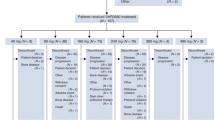Abstract
Purpose: Previous studies indicate that suramin may be an active agent for treating hormone-retractory prostate cancer. However, antitumour responses were observed in initial experiments only when plasma suramin concentrations were maintanined in excess of 250 μg/ml. Dose-limiting toxicity, especially neurological toxicity, is directly related to the duration of exposure and sustained plasma drug concentrations of 300 μg/ml or more. Combination with other agents such as epidoxorubicin, a drug with demonstrable activity in metastatic prostatic carcinoma, could be more effective and allow reduced suramin doses, while maintaining the suramin antitumor effect; this could make suramin therapy more feasible. On the basis of preclinical synergistic activity for combined suramin/doxorubicin in prostate cancer cell lines, a pilot study in patients with metastatic hormone refractory prostate cancer was performed.Materials and methods: Ten patients with hormone-refractory prostate cancer received a fixed dosing scheme of suramin infusion in combination with weekly epidoxorubicin at 25 mg/m2. Therapy was discontinued for dose-limiting toxicity or progressive disease.Results: None of the ten patients achieved a prostate-specific antigen reduction of more than 50% and no objective responses were observed in any patient. Dose-limiting toxicity was observed in four patients: grade 3 neurotoxicity was observed in three patients and grade 3 nephrotoxicity in one patient.Conclusions: Suramin/epidoxorubicin association, despite the encouraging preclinical results, was not able to improve the antitumour activity of suramin and showed significant toxicity. The results achieved in our study, although in a small number of patients, seem to suggest that this regimen cannot be recommended for use in the treatment of metastatic hormone-refractory prostate cancer.
Similar content being viewed by others
Abbreviations
- PSA :
-
prostate-specific antigen
References
Bejnen JH, Van Gijn R, De Clippeleir JJM, Vlasveld LTH, Horenblas S, Underberg WJM (1990) Rapid determination of suramin in micro-volumes of plasma by using ion-pair high performance liquid chromatography. J Drug Dev 3:21–26
Bitton RJ, Figg WD, Venzon DJ, Dalakas MC, Bowden C, Headlee D, Reed E, Myers CE, Cooper MR (1995) Pharmacologic variables associated with the development of neurologic toxicity in patients treated with suramin. J Clin Oncol 13:2223–2229
Dawson NA, Steinberg SM, Figg WD, et al (1995) A phase II trial of leuprolide, flutamide and suramin in previously untreated metastatic prostate cancer. Proc Am Soc Clin Oncol 14:236
Eisenberger MA, Reyno LM (1994) Suramin. Cancer Treat Rev 20:259–273
Eisenberger MA, Reyno LM, Jodrell DI, Sinibaldi VJ, Tkaczuk K, Sridhara E, Lowitt M, Jacobs S, Egorin M (1993) Suramin an active drug for prostate cancer: interim observations in a phase I trial. J Natl Cancer Inst 85:611–621
Eisenberger MA, Sinibaldi V, Reyno LM, Sridhara R, Jodrell D, Zuhowski E, Tkaczuk K, Lowitt M, Hemady R, Jacobs S, VanEcho D, Egorin M (1995) Phase I and clinical evaluation of a pharmacologically guided regimen of suramin in patients with hormone-refractory prostate cancer. J Clin Oncol 13:2174–2186
Fruehauf G, Myers C, Sinha B (1990) Synergistic activity of suramin with tumor necrosis factor alpha and doxorubicin on human prostate cancer cell lines. J Natl Cancer Inst 82:1206–1209
Leith JT, Michelson S (1991) Suramin and tumor cell radiosensitivity. Eur J Cancer 27:108
Ming-Tu S, Mc Connel K, Marin MC, Campbell ML, Fernandez A, Von Eschenbach AC, Mc Donnel T (1995) Combination Adriamycin and suramin induces apoptosis in Bcl-2 expressing prostate carcinoma cells. Cancer Lett 93:147–155
Myers C, Cooper M, Stein C, La Rocca R, Walther M, Weiss G, Choyke P, Dawson M, Steinberg S, Uhrich M, Cassidy J, Kohler DR, Trepel J, Linehan M (1992) Suramin: a novel growth factor antagonist with activity in hormone refractory metastatic prostate cancer. J Clin Oncol 10:881–889
Newling W (1992) The use of Adrianmycin and its derivatives in the treatment of prostatic cancer. Cancer Chemother Pharmacol 30 [Suppl]:90–94
Rapoport BL, Ansell S, Coccia-Portugal MA, de Wet M, Falsron G (1991) Phase II clinical study of suramin in combination with mitomycin-C in patients with hormone resistant prostate cancer. J Clin Oncol 10:177
Reyno LM, Egorin MJ, Eisenberger M, Sinibaldi V, Zubowski E, Sridhara R (1995) Development and validation of a pharmacokinetically based fixed dosing scheme for suramin. J Clin Oncol 13:2187–2195
Tannok IF, Gospodarowicz M, Meakin W, Panzarella T, Stewart L, Ridez W (1989) Treatment of metastatic prostate cancer with low dose prednisone: evaluation of pain and quality of life as a pragmatic indices of response. J Clin Oncol 7:590–597
Yagoda A, Petrylak D (1993) Cytotoxic chemotherapy for advanced hormone-resistant prostate cancer. Cancer 71 [Suppl]:1098–1109
Author information
Authors and Affiliations
Rights and permissions
About this article
Cite this article
Miglietta, L., Canobbio, L., Granetto, C. et al. Suramin/epidoxorubicin association in hormone-refractory prostate cancer: preliminary results of a pilot phase II study. J Cancer Res Clin Oncol 123, 407–410 (1997). https://doi.org/10.1007/BF01240125
Received:
Accepted:
Issue Date:
DOI: https://doi.org/10.1007/BF01240125




